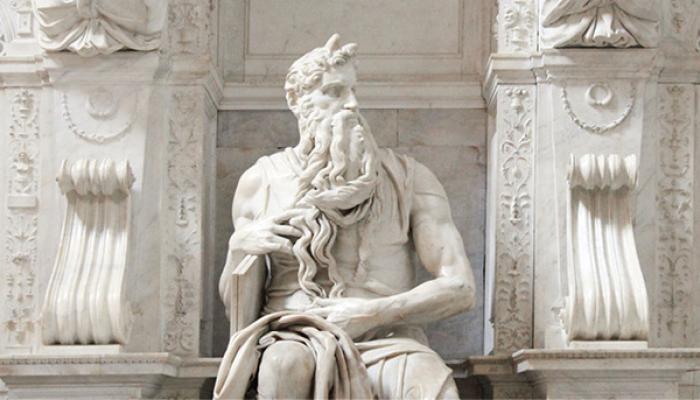
1.23 Why is Abraham so important?
Abraham had almost everything he wanted, when God asked him one day to leave behind his country and his possessions, and to travel with his family to a land that God would show him (Gen. 12:1) Gen. 12:1: The Lord said to Abram, “Go from your country and your kindred and your father’s house to the land that I will show you”.. God promised him many descendants. Abraham trusted God, and rightly so: despite their advanced age, a son (Isaac) was born to Abraham and his wife Sarah (Gen. 21:2-3) Gen. 21:2-3: Sarah conceived, and bore Abraham a son in his old age at the time of which God had spoken to him. Abraham called the name of his son who was born to him, whom Sarah bore him, Isaac..
As an ultimate test, God asked Abraham to sacrifice his son. Despite his grief, he was willing to obey, but God stopped him just in time. Abraham had shown that he placed his love for God above everything else, and in this way he cooperated with God’s plan. God can do great things through us if we trust in him and cooperate with him.
How does God reveal himself in the Old Testament?
God shows himself in the Old Testament as God, who created the world out of love and remains faithful to men even when they have fallen away from him into sin.
God makes it possible to experience him in history: with Noah he establishes a covenant to save all living things. He calls Abraham so as to make him “the father of a multitude of nations” (Gen 17:5b) and to bless “all the families of the earth” in him (Gen 12:3b). The people Israel, sprung from Abraham, becomes his special possession. To Moses he introduces himself by name. This mysterious name Yhwh, usually transcribed Yahweh, means “I am who I am” (Ex 3:14). He frees Israel from slavery in Egypt, establishes a covenant with them on Sinai, and through Moses gives them the law. Again and again, God sends prophets to his people to call them to conversion and to the renewal of the covenant. The prophets proclaim that God will establish a new and everlasting covenant, which will bring about a radical renewal and definitive redemption. This covenant will be open to all human beings. [Youcat 8]
Who are the principal witnesses of the obedience of faith in the Sacred Scriptures?
There are many such witnesses, two in particular: One is Abraham who when put to the test “believed in God” (Romans 4:3) and always obeyed his call. For this reason he is called “the Father of all who believe” (Romans 4:11-18). The other is the Virgin Mary who, throughout her entire life, embodied in a perfect way the obedience of faith: “Let it be done to me according to your word” (Luke 1:38). [CCCC 26]
How can we respond to God when he speaks to us?
To respond to God means to believe him.
Anyone who wants to believe needs a heart that is ready to listen (see 1 Kings 3:9). In many ways God seeks contact with us. In every human encounter, in every moving experience of nature, in every apparent coincidence, in every challenge, every suffering, there is a hidden message from God to us. He speaks even more clearly to us when he turns to us in his Word or in the voice of our conscience. He addresses us as friends. Therefore we, too, should respond as friends and believe him, trust him completely, learn to understand him better and better, and accept his will without reservation. [Youcat 20]
By his covenant with Abraham (cf. Gen 15:18) and, through Moses, with the race of Israel (cf. Ex 24:8), he gained a people for himself, and to them he revealed himself in words and deeds as the one, living and true God. It was his plan that Israel might learn by experience God’s ways with humanity and, by listening to the voice of God speaking to them through the prophets, might gradually understand his ways more fully and more clearly, and make them more widely known among the nations. [Pope Benedict XVI, Verbum Domini, n. 11]





